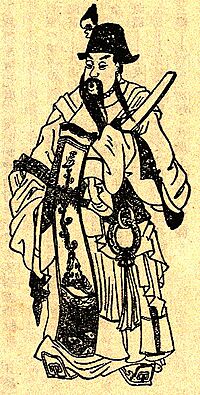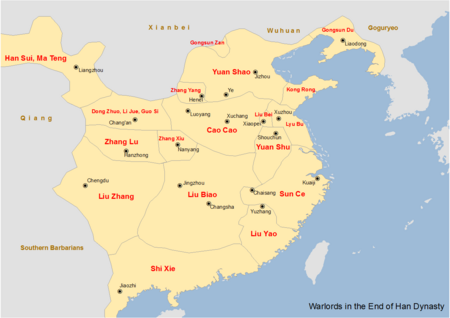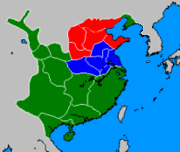Yuan Shao facts for kids
Quick facts for kids
Yuan Shao
|
|
|---|---|
| 袁紹 | |

A Qing dynasty illustration of Yuan Shao
|
|
| General-in-Chief (大將軍) | |
| In office 196 – 28 June 202 |
|
| Monarch | Emperor Xian of Han |
| General of the Right (右將軍) | |
| In office 195–196 |
|
| Monarch | Emperor Xian of Han |
| Governor of Ji Province (冀州牧) | |
| In office 191 – 28 June 202 |
|
| Monarch | Emperor Xian of Han |
| Preceded by | Han Fu |
| Succeeded by | Yuan Shang |
| Colonel-Director of Retainers (司隸校尉) (self-appointed) |
|
| In office 190–191 |
|
| Monarch | Emperor Xian of Han |
| General of Chariots and Cavalry (車騎將軍) (self-appointed) |
|
| In office 190–191 |
|
| Monarch | Emperor Xian of Han |
| Administrator of Bohai (勃海太守) | |
| In office 190 |
|
| Monarch | Emperor Xian of Han |
| Personal details | |
| Born | Unknown Shangshui County, Henan |
| Died | 28 June 202 Handan, Hebei |
| Spouses |
|
| Children |
|
| Parent |
|
| Relatives |
|
| Occupation | Military general, politician, warlord |
| Courtesy name | Benchu (本初) |
| Peerage | Marquis of Ye (郿侯) |
| Military service | |
| Allegiance | Han Empire Guandong Coalition Yuan Shao's forces |
| Battles/wars | Massacre of the Eunuchs Campaign against Dong Zhuo Battle of Jieqiao Battle of Fengqiu Campaign against Yuan Shu Battle of Guandu |
| Yuan Shao | |||||||||||||||||||||||||
|---|---|---|---|---|---|---|---|---|---|---|---|---|---|---|---|---|---|---|---|---|---|---|---|---|---|
| Traditional Chinese | 袁紹 | ||||||||||||||||||||||||
| Simplified Chinese | 袁绍 | ||||||||||||||||||||||||
|
|||||||||||||||||||||||||
Yuan Shao (袁紹), also known by his courtesy name Benchu (本初), was a powerful leader and general in ancient China. He lived during the late Eastern Han dynasty, a time when China was facing many civil wars. Yuan Shao controlled large parts of northern China. He was also the older half-brother of Yuan Shu, another powerful leader, though they didn't get along well.
Yuan Shao was one of the strongest leaders of his time. He led a group of other leaders against Dong Zhuo, who was controlling the young Emperor Xian. However, this group failed because the leaders couldn't agree among themselves. Later, in the year 200, Yuan Shao fought a big war against his rival, Cao Cao, but he lost the important Battle of Guandu. He died from sickness two years later. Even though he came from an important family and had a strong position, he often couldn't make up his mind and didn't always listen to good advice. This is often seen as why he eventually failed.
Contents
Yuan Shao's Family Background
Yuan Shao was born in a place called Ruyang County, which is in today's Henan province. His family, the Yuan family, was very famous and powerful in the Han government for over four generations. Many family members held high positions. Yuan Shao was a son of Yuan Feng. He was the eldest sibling, which made his half-brother, Yuan Shu, unhappy. Both Yuan Shao and Yuan Shu were great-grandsons of Yuan An, a famous official.
Yuan Shao's mother was originally a servant. But because Yuan Feng didn't have any other sons, Yuan Shao's birth made his mother a higher-ranked wife. Some old books say that Yuan Shao was actually an older cousin of Yuan Shu. They say he was adopted by Yuan Feng's older brother, Yuan Cheng, who also had no sons. This adoption made Yuan Shu very angry. Yuan Shu's own mother had a higher rank than Yuan Shao's mother. But with Yuan Shao adopted, Yuan Shu was no longer the highest-ranked male of his generation. Yuan Shao got more special treatment than Yuan Shu, even though Yuan Shu was a blood relative.
Later, when Yuan Shao and Yuan Shu fought, Yuan Shu used Yuan Shao's mother's background to say that Yuan Shao wasn't a "true son" of the Yuan family. Yuan Shao was known for being serious and respecting talented people, no matter where they came from. Because of this, many people liked him from a young age, including Cao Cao and Zhang Miao.
Early Life and Service (Around 169–189 AD)
In his younger years, Yuan Shao helped some people who were being unfairly treated by the government. He even befriended He Yong, who was one of these people. He Yong and Yuan Shao secretly worked together to help those who were poor or in prison.
After he joined the government, Yuan Shao worked for the General-in-Chief He Jin. He Jin trusted Yuan Shao a lot.
The Eunuch Problem
After Emperor Ling died in 189 AD, He Jin and Yuan Shao planned to get rid of the powerful group of palace servants called the eunuchs. But the Empress Dowager He didn't agree. So, He Jin called Dong Zhuo to bring his army to the capital city, Luoyang, to pressure the Empress Dowager.
The eunuchs became scared. They tricked He Jin by sending a fake order from the Empress Dowager, telling him to come into the palace. Yuan Shao warned He Jin not to go, telling him to attack the eunuchs instead. But He Jin didn't listen. On September 22, 189 AD, He Jin was attacked and killed by the eunuchs inside the palace.
He Jin's angry followers then set the palace on fire and rushed in. They killed over 2,000 people. The young Emperor Shao and his brother, Prince of Chenliu (who would become Emperor Xian), escaped during the chaos. When Dong Zhuo arrived, he found and rescued the emperor and prince. This allowed Dong Zhuo to take control of the capital.
Dong Zhuo wanted to remove Emperor Shao and put the Prince of Chenliu on the throne, but Yuan Shao disagreed. Their relationship got worse, and Yuan Shao fled from Luoyang to Ji Province (today's southern Hebei). Dong Zhuo thought about sending soldiers after him, but some officials convinced Dong Zhuo to let Yuan Shao go. Dong Zhuo even made Yuan Shao the Administrator of Bohai Commandery to try and make him happy.
Fighting Dong Zhuo (190–191 AD)
By early 190 AD, Yuan Shao was openly against Dong Zhuo. Many local officials and commanders from the eastern parts of China, including Cao Cao, Yuan Shu, and others, joined Yuan Shao. They formed a group to remove Dong Zhuo. Yuan Shao declared himself General of Chariots and Cavalry and set up his camp near the Yellow River, north of Luoyang.
Dong Zhuo ordered all members of the Yuan family in Luoyang to be killed. He also sent messages to the regional officials, telling them to break up their armies. But the leaders in Yuan Shao's group listened to Yuan Shao and killed Dong Zhuo's messengers instead. Dong Zhuo then moved the capital to Chang'an, a city closer to his home base. A year later, Dong Zhuo burned Luoyang to the ground and moved west with many people who had fled the city.
Sun Jian and Cao Cao wanted to chase Dong Zhuo's army, but Yuan Shao and most others in the group disagreed. Cao Cao went alone and was defeated.
The Group Breaks Apart
During this time, Yuan Shao and Han Fu wanted to make Liu Yu, the governor of You Province, the new emperor. They thought this would make their group stronger. But Liu Yu refused, saying it would be disloyal to Emperor Xian.
When the leaders of the group saw the ruined capital, they realized the Han dynasty was ending. They started planning to make their own positions stronger. Soon, they all went back to their home bases.
Taking Control of Northern China (191–199 AD)
Many volunteers joined Yuan Shao, but his small area of Bohai Commandery was not enough to support his large army. So, Yuan Shao secretly worked with another leader, Gongsun Zan, to attack Han Fu's Ji Province. Han Fu was scared of Gongsun Zan's attack. So, he listened to Yuan Shao's people and gave up control of Ji Province to Yuan Shao. Yuan Shao then started building his power from Ye, the capital of Ji Province.
To stop Yuan Shu from becoming too powerful, Yuan Shao made an alliance with Cao Cao. He sent his follower, Zhou Yu, to attack Yuan Shu's areas. In response, Yuan Shu allied with Gongsun Zan and ordered Sun Jian to fight Yuan Shao.
The first battles between the Yuan brothers ended with Yuan Shu winning. This fighting showed that the alliance against Dong Zhuo was completely broken. The leaders in northern China began fighting each other for control.
To focus on his fights with Gongsun Zan, Yuan Shao made an alliance with Liu Biao against Yuan Shu. In the winter of that year, Yuan Shao defeated Gongsun Zan's strong cavalry at the Battle of Jieqiao by using many crossbowmen. The Han court ordered them to stop fighting. Yuan Shao then went back to Ye and started fighting the Heishan bandits, who were causing trouble. With some help from Lü Bu, Yuan Shao defeated the bandits. This greatly reduced the threat from the bandits on his western side.
Conquering Qing Province
Even though some of his advisors warned him, Yuan Shao sent his oldest son, Yuan Tan, to "govern" Qing Province. In the following years, Yuan Shao successfully made his territory stronger. Yuan Tan also did very well in Qing Province, defeating Gongsun Zan's general in 193 and another leader in 196.
Missing an Opportunity
In 195 AD, an advisor named Ju Shou suggested that Yuan Shao invite Emperor Xian to Ji Province. This would allow Yuan Shao to control the government and use the emperor to make his own rule seem more legitimate. However, other advisors disagreed, saying Yuan Shao would have to give up some of his power to the emperor. Yuan Shao valued his independence, so he listened to them and missed this chance. His future rival, Cao Cao, took the opportunity instead. Cao Cao welcomed Emperor Xian to his base in Xuchang, which became the new capital.
In 196 AD, the Han court, now controlled by Cao Cao, offered Yuan Shao a high position. But Yuan Shao refused it because it was lower than Cao Cao's position. So, Cao Cao gave up his own position and offered it to Yuan Shao, who gladly accepted. Yuan Shao was also given the title of Marquis of Ye.
Defeating Gongsun Zan
In 198 AD, Yuan Shao attacked Gongsun Zan and surrounded his remaining forces. By early 199 AD, Yuan Shao had completely defeated Gongsun Zan in the Battle of Yijing. This gave Yuan Shao complete control over the four provinces north of the Yellow River. After making an alliance with the Wuhuan tribes in the north, Yuan Shao turned his attention to Cao Cao, who had become very powerful south of the Yellow River.
The Guandu Campaign (199–201 AD)
Both Yuan Shao and Cao Cao prepared for a major battle. By the end of 199 AD, they had already fought some small battles. Cao Cao set up his defenses around Guandu, south of the Yellow River.
In early 200 AD, Liu Bei left Cao Cao and settled in Xu Province. Cao Cao left his northern front open to Yuan Shao and went east to deal with Liu Bei. An advisor named Tian Feng told Yuan Shao to attack Cao Cao while he was away, but Yuan Shao refused to launch a full attack. Instead, he sent small groups to bother Cao Cao's army. Cao Cao's general, Yu Jin, defeated these groups.
Soon after Cao Cao returned to Guandu, Yuan Shao had a document written that strongly criticized Cao Cao. This was like a declaration of war. Yuan Shao then marched his main army, which had over 100,000 experienced soldiers and hundreds of thousands of less trained fighters, towards the Yellow River. Yuan Shao's army was much larger than Cao Cao's and had a strong cavalry. His first attacks almost broke through Cao Cao's defenses.
It is said that Cao Cao thought about giving up several times. But his main strategist, Xun Yu, strongly encouraged him to keep fighting. Then, one of Yuan Shao's strategists, Xu You, unexpectedly switched sides to Cao Cao. Xu You gave Cao Cao secret information about where Yuan Shao's food supplies were stored. In late 200 AD, Cao Cao led a small force to attack Yuan Shao's supply base at Wuchao and burned it down. This caused huge damage to the morale of Yuan Shao's army.
Two of Yuan Shao's officers, Zhang He and Gao Lan, immediately joined Cao Cao after hearing what happened at Wuchao. Many others followed them. Yuan Shao couldn't stop his army from falling apart. He fled north across the Yellow River with only a few hundred loyal followers.
This was Yuan Shao's first big defeat, and it was a decisive one. After this, he lost his advantage over Cao Cao and never got it back. In 201 AD, Cao Cao defeated him again and captured several of Yuan Shao's territories.
Yuan Shao's Final Years (201–202 AD)
After the Battle of Cangting, Cao Cao's tired troops went south to rest. Meanwhile, Yuan Shao was able to reorganize his defeated armies and stop rebellions in his own territory. He soon brought order back.
Yuan Shao had three sons. He liked his third son, Yuan Shang, the most because he was handsome. Both Yuan Tan and Yuan Shang were considered as his choice to take over after him. However, Yuan Shao never made a final decision about who would succeed him before he died on June 28, 202 AD. This left his territory to be fought over by his sons and Cao Cao.
Right after Yuan Shao's death, two important advisors, Shen Pei and Pang Ji, supported Yuan Shang to become the new leader, even though Yuan Tan disagreed. Yuan Shao's wife, Lady Liu, also supported Yuan Shang. Yuan Tan couldn't change the outcome when he rushed back from Qing Province. Lady Liu, who was in charge of the Yuan household after her husband died, killed Yuan Shao's other five wives out of jealousy.
Just as an advisor had warned, chaos broke out among Yuan Shao's forces. Cao Cao used this internal fighting to his advantage. By 207 AD, Cao Cao had completely defeated Yuan Shao's sons and their remaining forces.
Cao Cao visited Yuan Shao's tomb after conquering Ye city in 204 AD. He cried sadly for his old friend in front of his followers. He also gave Yuan Shao's family gifts and a government payment to help them.
Family
- Ancestors:
- Yuan An, great-great-grandfather, a high-ranking official.
- Yuan Jing, great-grandfather, a high-ranking official.
- Yuan Tang, grandfather, a high-ranking official.
- Father: Yuan Feng, a high-ranking official.
- Siblings:
- Yuan Ji, elder half-brother.
- Yuan Shu, younger half-brother, a powerful leader who later declared himself emperor.
- Wives:
- Principal wife, mother of Yuan Tan and Yuan Xi.
- Lady Liu, mother of Yuan Shang.
- Five other wives, all killed by Lady Liu.
- Children:
- Yuan Tan, eldest son, fought against Yuan Shang after his father's death, killed by Cao Cao.
- Yuan Xi, second son, fled with Yuan Shang and was later killed.
- Yuan Shang, third son, Yuan Shao's chosen successor, fought against Yuan Tan, fled with Yuan Xi and was later killed.
- Relatives:
- Yuan Wei, uncle, a high-ranking official.
- Yuan Cheng, uncle.
- Yuan Yi, elder cousin.
- Yuan Xu, younger cousin.
- Yuan Yin, younger cousin.
- Yuan Manlai, cousin.
- Yuan Yida, cousin.
- Yuan Renda, cousin.
- Gao Gan, nephew.
|
See also
 In Spanish: Yuan Shao para niños
In Spanish: Yuan Shao para niños
 | Percy Lavon Julian |
 | Katherine Johnson |
 | George Washington Carver |
 | Annie Easley |



